LAW514 Commercial Law: Analyzing Rajeev's Case on Business Laws
VerifiedAdded on 2023/06/15
|7
|1681
|147
Report
AI Summary
This report addresses two key legal issues: whether an agreement between Rajeev and Vicky for the sale of a café is valid, focusing on misrepresentation, and whether Rajeev can leverage consumer laws given the scenario. The analysis applies contract law principles, particularly those related to misrepresentation, referencing relevant case law to determine if Rajeev can rescind the contract due to Nicky's failure to disclose the illegality of the outside seating arrangement. Furthermore, the report examines the applicability of Australian Consumer Law (ACL), concluding that Rajeev, purchasing the café for commercial purposes, does not fall within the ACL's definition of a consumer and thus cannot utilize consumer law provisions in this situation. The document refers to the Australian Competition and Consumer Act 2010 and relevant case laws.
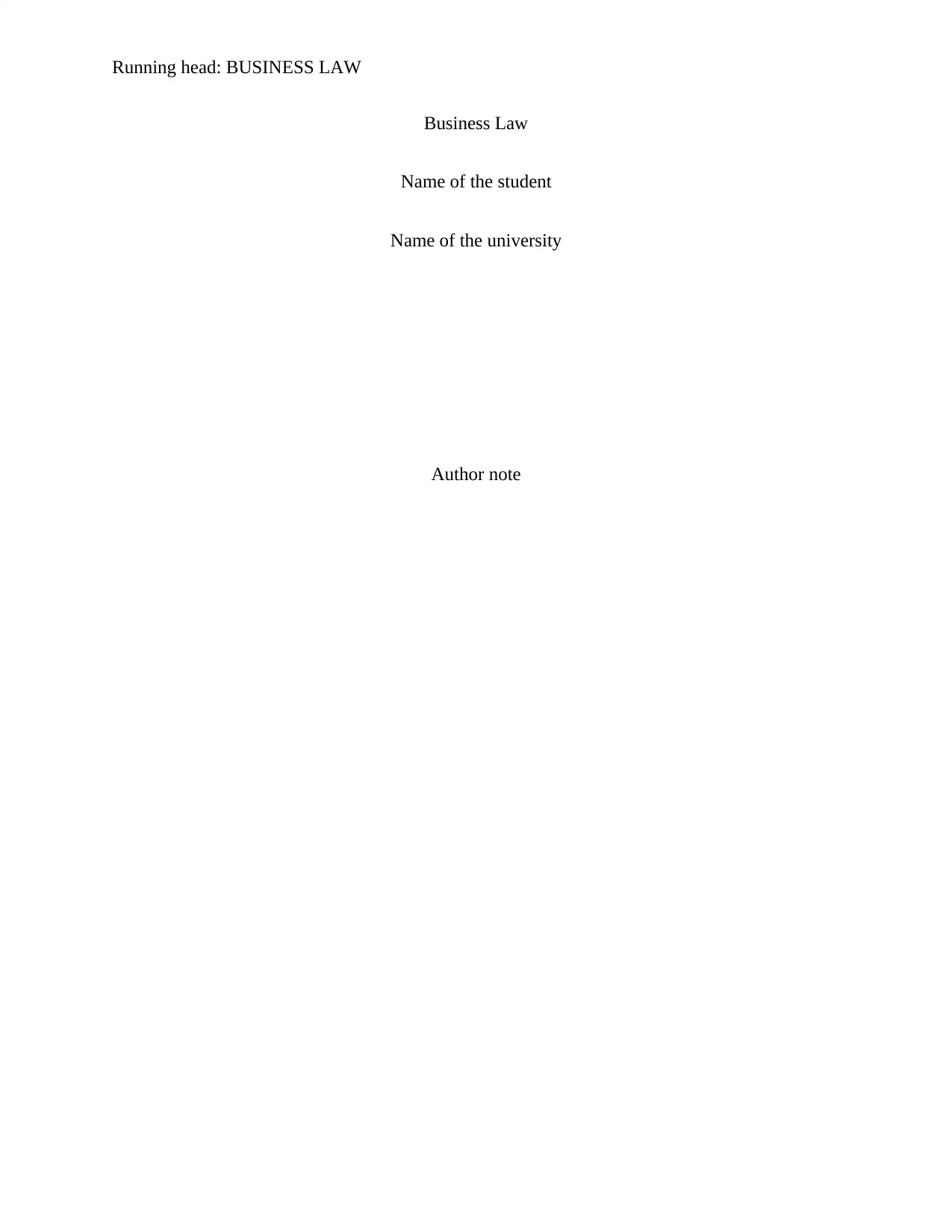
Running head: BUSINESS LAW
Business Law
Name of the student
Name of the university
Author note
Business Law
Name of the student
Name of the university
Author note
Paraphrase This Document
Need a fresh take? Get an instant paraphrase of this document with our AI Paraphraser
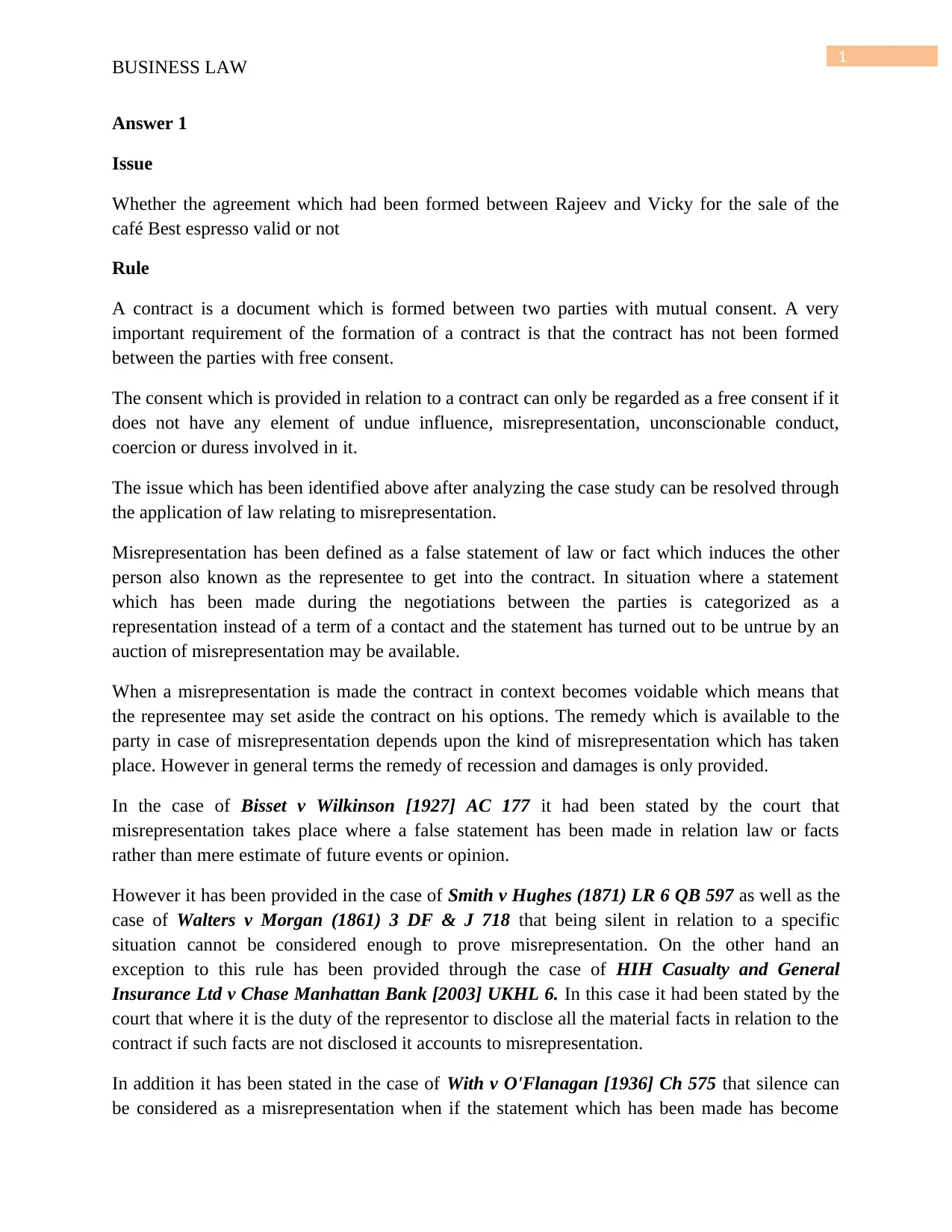
1
BUSINESS LAW
Answer 1
Issue
Whether the agreement which had been formed between Rajeev and Vicky for the sale of the
café Best espresso valid or not
Rule
A contract is a document which is formed between two parties with mutual consent. A very
important requirement of the formation of a contract is that the contract has not been formed
between the parties with free consent.
The consent which is provided in relation to a contract can only be regarded as a free consent if it
does not have any element of undue influence, misrepresentation, unconscionable conduct,
coercion or duress involved in it.
The issue which has been identified above after analyzing the case study can be resolved through
the application of law relating to misrepresentation.
Misrepresentation has been defined as a false statement of law or fact which induces the other
person also known as the representee to get into the contract. In situation where a statement
which has been made during the negotiations between the parties is categorized as a
representation instead of a term of a contact and the statement has turned out to be untrue by an
auction of misrepresentation may be available.
When a misrepresentation is made the contract in context becomes voidable which means that
the representee may set aside the contract on his options. The remedy which is available to the
party in case of misrepresentation depends upon the kind of misrepresentation which has taken
place. However in general terms the remedy of recession and damages is only provided.
In the case of Bisset v Wilkinson [1927] AC 177 it had been stated by the court that
misrepresentation takes place where a false statement has been made in relation law or facts
rather than mere estimate of future events or opinion.
However it has been provided in the case of Smith v Hughes (1871) LR 6 QB 597 as well as the
case of Walters v Morgan (1861) 3 DF & J 718 that being silent in relation to a specific
situation cannot be considered enough to prove misrepresentation. On the other hand an
exception to this rule has been provided through the case of HIH Casualty and General
Insurance Ltd v Chase Manhattan Bank [2003] UKHL 6. In this case it had been stated by the
court that where it is the duty of the representor to disclose all the material facts in relation to the
contract if such facts are not disclosed it accounts to misrepresentation.
In addition it has been stated in the case of With v O'Flanagan [1936] Ch 575 that silence can
be considered as a misrepresentation when if the statement which has been made has become
BUSINESS LAW
Answer 1
Issue
Whether the agreement which had been formed between Rajeev and Vicky for the sale of the
café Best espresso valid or not
Rule
A contract is a document which is formed between two parties with mutual consent. A very
important requirement of the formation of a contract is that the contract has not been formed
between the parties with free consent.
The consent which is provided in relation to a contract can only be regarded as a free consent if it
does not have any element of undue influence, misrepresentation, unconscionable conduct,
coercion or duress involved in it.
The issue which has been identified above after analyzing the case study can be resolved through
the application of law relating to misrepresentation.
Misrepresentation has been defined as a false statement of law or fact which induces the other
person also known as the representee to get into the contract. In situation where a statement
which has been made during the negotiations between the parties is categorized as a
representation instead of a term of a contact and the statement has turned out to be untrue by an
auction of misrepresentation may be available.
When a misrepresentation is made the contract in context becomes voidable which means that
the representee may set aside the contract on his options. The remedy which is available to the
party in case of misrepresentation depends upon the kind of misrepresentation which has taken
place. However in general terms the remedy of recession and damages is only provided.
In the case of Bisset v Wilkinson [1927] AC 177 it had been stated by the court that
misrepresentation takes place where a false statement has been made in relation law or facts
rather than mere estimate of future events or opinion.
However it has been provided in the case of Smith v Hughes (1871) LR 6 QB 597 as well as the
case of Walters v Morgan (1861) 3 DF & J 718 that being silent in relation to a specific
situation cannot be considered enough to prove misrepresentation. On the other hand an
exception to this rule has been provided through the case of HIH Casualty and General
Insurance Ltd v Chase Manhattan Bank [2003] UKHL 6. In this case it had been stated by the
court that where it is the duty of the representor to disclose all the material facts in relation to the
contract if such facts are not disclosed it accounts to misrepresentation.
In addition it has been stated in the case of With v O'Flanagan [1936] Ch 575 that silence can
be considered as a misrepresentation when if the statement which has been made has become
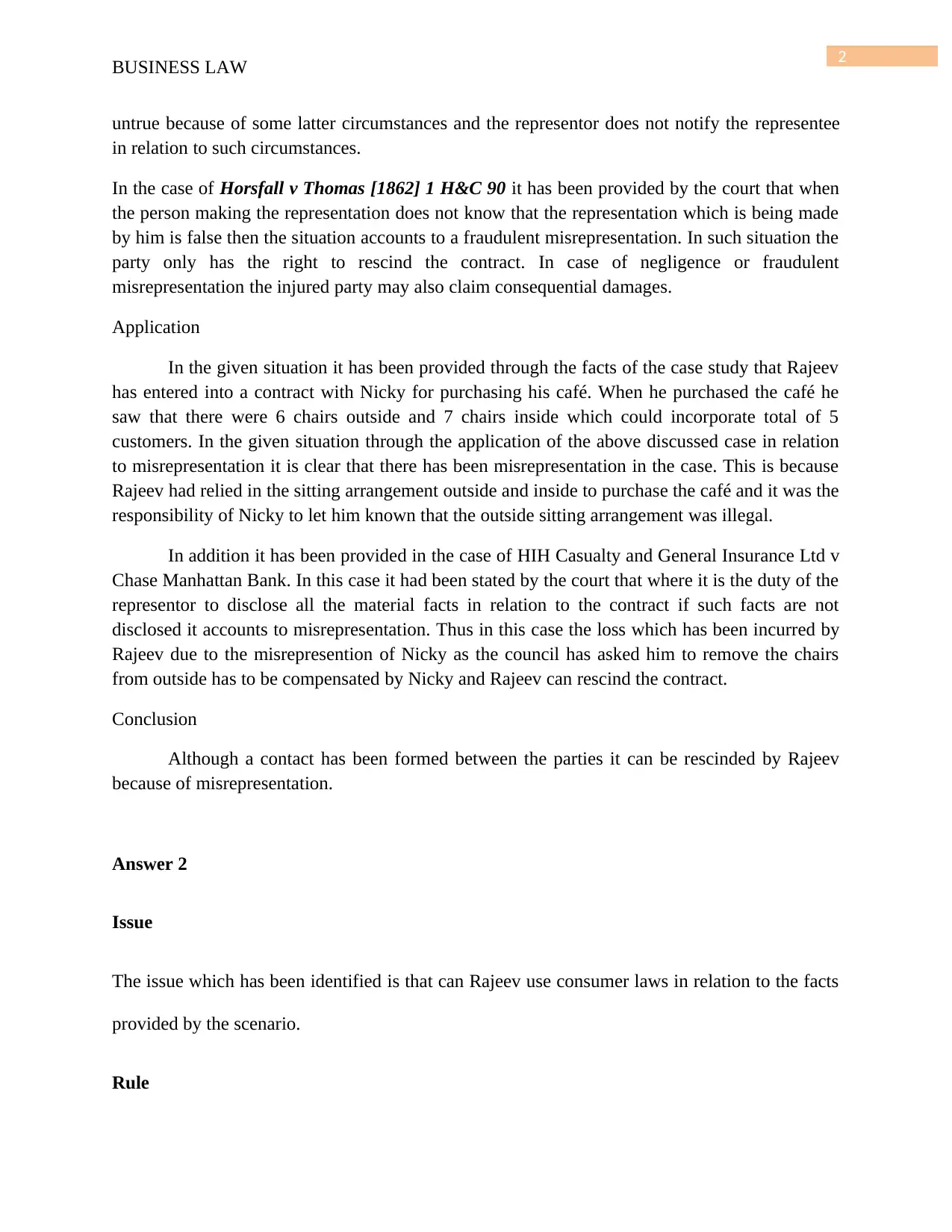
2
BUSINESS LAW
untrue because of some latter circumstances and the representor does not notify the representee
in relation to such circumstances.
In the case of Horsfall v Thomas [1862] 1 H&C 90 it has been provided by the court that when
the person making the representation does not know that the representation which is being made
by him is false then the situation accounts to a fraudulent misrepresentation. In such situation the
party only has the right to rescind the contract. In case of negligence or fraudulent
misrepresentation the injured party may also claim consequential damages.
Application
In the given situation it has been provided through the facts of the case study that Rajeev
has entered into a contract with Nicky for purchasing his café. When he purchased the café he
saw that there were 6 chairs outside and 7 chairs inside which could incorporate total of 5
customers. In the given situation through the application of the above discussed case in relation
to misrepresentation it is clear that there has been misrepresentation in the case. This is because
Rajeev had relied in the sitting arrangement outside and inside to purchase the café and it was the
responsibility of Nicky to let him known that the outside sitting arrangement was illegal.
In addition it has been provided in the case of HIH Casualty and General Insurance Ltd v
Chase Manhattan Bank. In this case it had been stated by the court that where it is the duty of the
representor to disclose all the material facts in relation to the contract if such facts are not
disclosed it accounts to misrepresentation. Thus in this case the loss which has been incurred by
Rajeev due to the misrepresention of Nicky as the council has asked him to remove the chairs
from outside has to be compensated by Nicky and Rajeev can rescind the contract.
Conclusion
Although a contact has been formed between the parties it can be rescinded by Rajeev
because of misrepresentation.
Answer 2
Issue
The issue which has been identified is that can Rajeev use consumer laws in relation to the facts
provided by the scenario.
Rule
BUSINESS LAW
untrue because of some latter circumstances and the representor does not notify the representee
in relation to such circumstances.
In the case of Horsfall v Thomas [1862] 1 H&C 90 it has been provided by the court that when
the person making the representation does not know that the representation which is being made
by him is false then the situation accounts to a fraudulent misrepresentation. In such situation the
party only has the right to rescind the contract. In case of negligence or fraudulent
misrepresentation the injured party may also claim consequential damages.
Application
In the given situation it has been provided through the facts of the case study that Rajeev
has entered into a contract with Nicky for purchasing his café. When he purchased the café he
saw that there were 6 chairs outside and 7 chairs inside which could incorporate total of 5
customers. In the given situation through the application of the above discussed case in relation
to misrepresentation it is clear that there has been misrepresentation in the case. This is because
Rajeev had relied in the sitting arrangement outside and inside to purchase the café and it was the
responsibility of Nicky to let him known that the outside sitting arrangement was illegal.
In addition it has been provided in the case of HIH Casualty and General Insurance Ltd v
Chase Manhattan Bank. In this case it had been stated by the court that where it is the duty of the
representor to disclose all the material facts in relation to the contract if such facts are not
disclosed it accounts to misrepresentation. Thus in this case the loss which has been incurred by
Rajeev due to the misrepresention of Nicky as the council has asked him to remove the chairs
from outside has to be compensated by Nicky and Rajeev can rescind the contract.
Conclusion
Although a contact has been formed between the parties it can be rescinded by Rajeev
because of misrepresentation.
Answer 2
Issue
The issue which has been identified is that can Rajeev use consumer laws in relation to the facts
provided by the scenario.
Rule
⊘ This is a preview!⊘
Do you want full access?
Subscribe today to unlock all pages.

Trusted by 1+ million students worldwide
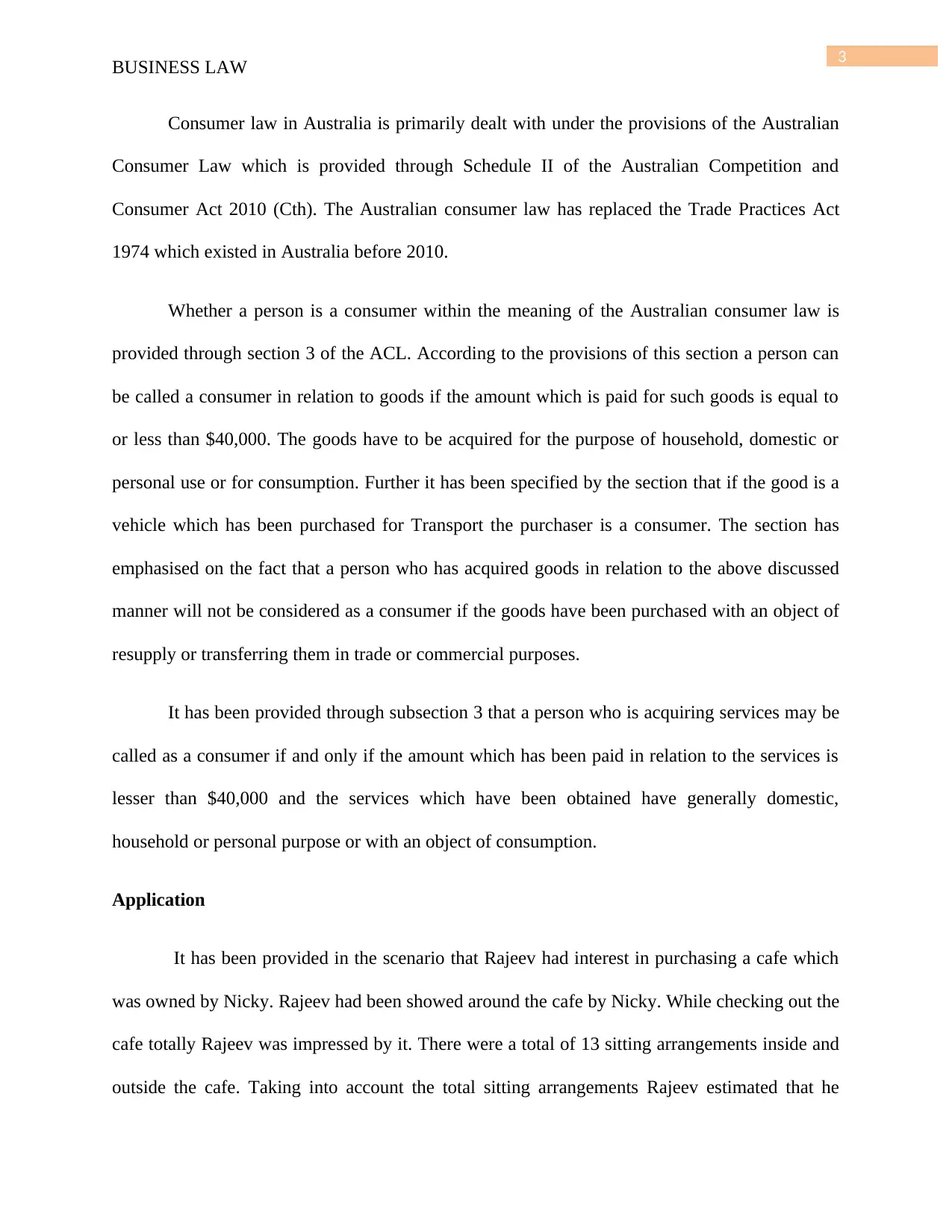
3
BUSINESS LAW
Consumer law in Australia is primarily dealt with under the provisions of the Australian
Consumer Law which is provided through Schedule II of the Australian Competition and
Consumer Act 2010 (Cth). The Australian consumer law has replaced the Trade Practices Act
1974 which existed in Australia before 2010.
Whether a person is a consumer within the meaning of the Australian consumer law is
provided through section 3 of the ACL. According to the provisions of this section a person can
be called a consumer in relation to goods if the amount which is paid for such goods is equal to
or less than $40,000. The goods have to be acquired for the purpose of household, domestic or
personal use or for consumption. Further it has been specified by the section that if the good is a
vehicle which has been purchased for Transport the purchaser is a consumer. The section has
emphasised on the fact that a person who has acquired goods in relation to the above discussed
manner will not be considered as a consumer if the goods have been purchased with an object of
resupply or transferring them in trade or commercial purposes.
It has been provided through subsection 3 that a person who is acquiring services may be
called as a consumer if and only if the amount which has been paid in relation to the services is
lesser than $40,000 and the services which have been obtained have generally domestic,
household or personal purpose or with an object of consumption.
Application
It has been provided in the scenario that Rajeev had interest in purchasing a cafe which
was owned by Nicky. Rajeev had been showed around the cafe by Nicky. While checking out the
cafe totally Rajeev was impressed by it. There were a total of 13 sitting arrangements inside and
outside the cafe. Taking into account the total sitting arrangements Rajeev estimated that he
BUSINESS LAW
Consumer law in Australia is primarily dealt with under the provisions of the Australian
Consumer Law which is provided through Schedule II of the Australian Competition and
Consumer Act 2010 (Cth). The Australian consumer law has replaced the Trade Practices Act
1974 which existed in Australia before 2010.
Whether a person is a consumer within the meaning of the Australian consumer law is
provided through section 3 of the ACL. According to the provisions of this section a person can
be called a consumer in relation to goods if the amount which is paid for such goods is equal to
or less than $40,000. The goods have to be acquired for the purpose of household, domestic or
personal use or for consumption. Further it has been specified by the section that if the good is a
vehicle which has been purchased for Transport the purchaser is a consumer. The section has
emphasised on the fact that a person who has acquired goods in relation to the above discussed
manner will not be considered as a consumer if the goods have been purchased with an object of
resupply or transferring them in trade or commercial purposes.
It has been provided through subsection 3 that a person who is acquiring services may be
called as a consumer if and only if the amount which has been paid in relation to the services is
lesser than $40,000 and the services which have been obtained have generally domestic,
household or personal purpose or with an object of consumption.
Application
It has been provided in the scenario that Rajeev had interest in purchasing a cafe which
was owned by Nicky. Rajeev had been showed around the cafe by Nicky. While checking out the
cafe totally Rajeev was impressed by it. There were a total of 13 sitting arrangements inside and
outside the cafe. Taking into account the total sitting arrangements Rajeev estimated that he
Paraphrase This Document
Need a fresh take? Get an instant paraphrase of this document with our AI Paraphraser
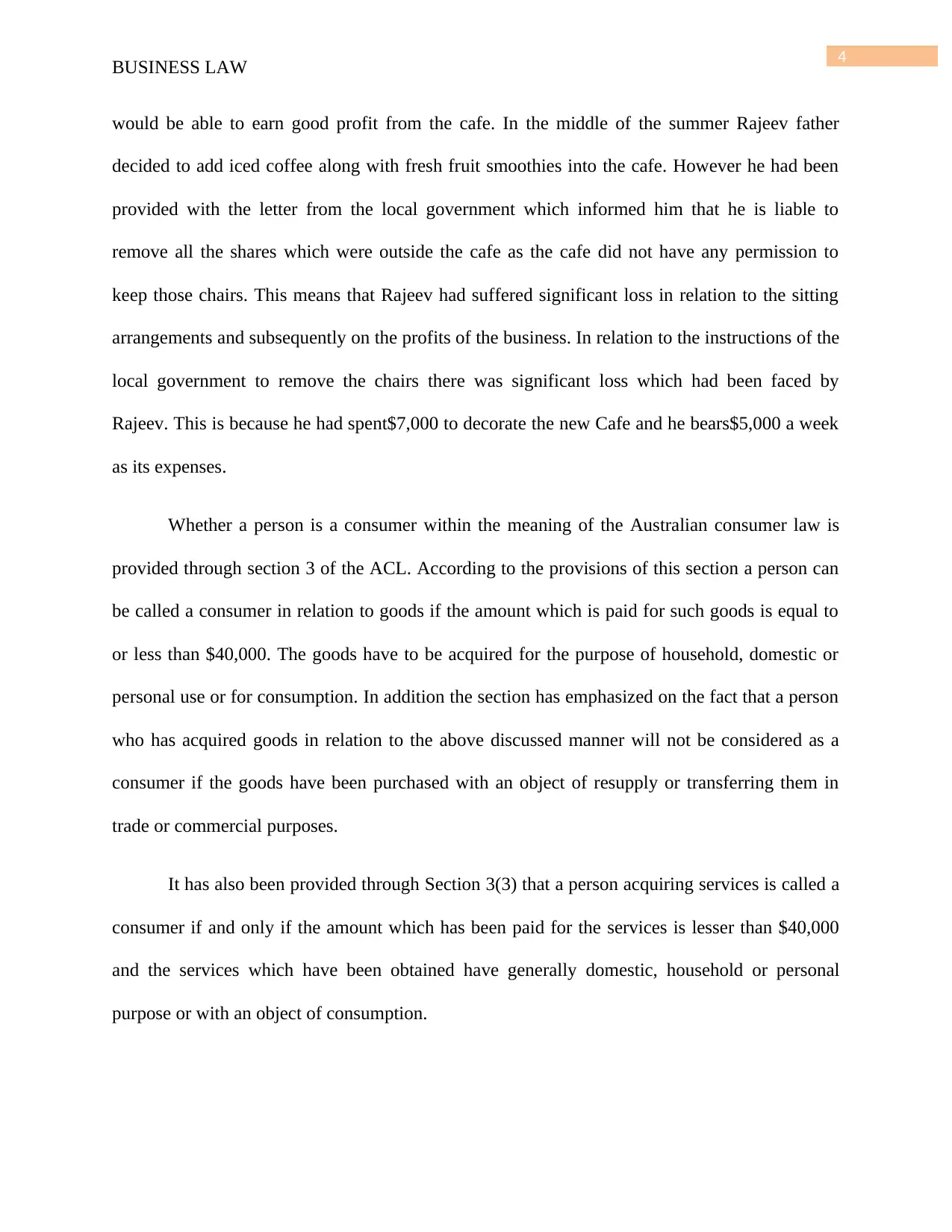
4
BUSINESS LAW
would be able to earn good profit from the cafe. In the middle of the summer Rajeev father
decided to add iced coffee along with fresh fruit smoothies into the cafe. However he had been
provided with the letter from the local government which informed him that he is liable to
remove all the shares which were outside the cafe as the cafe did not have any permission to
keep those chairs. This means that Rajeev had suffered significant loss in relation to the sitting
arrangements and subsequently on the profits of the business. In relation to the instructions of the
local government to remove the chairs there was significant loss which had been faced by
Rajeev. This is because he had spent$7,000 to decorate the new Cafe and he bears$5,000 a week
as its expenses.
Whether a person is a consumer within the meaning of the Australian consumer law is
provided through section 3 of the ACL. According to the provisions of this section a person can
be called a consumer in relation to goods if the amount which is paid for such goods is equal to
or less than $40,000. The goods have to be acquired for the purpose of household, domestic or
personal use or for consumption. In addition the section has emphasized on the fact that a person
who has acquired goods in relation to the above discussed manner will not be considered as a
consumer if the goods have been purchased with an object of resupply or transferring them in
trade or commercial purposes.
It has also been provided through Section 3(3) that a person acquiring services is called a
consumer if and only if the amount which has been paid for the services is lesser than $40,000
and the services which have been obtained have generally domestic, household or personal
purpose or with an object of consumption.
BUSINESS LAW
would be able to earn good profit from the cafe. In the middle of the summer Rajeev father
decided to add iced coffee along with fresh fruit smoothies into the cafe. However he had been
provided with the letter from the local government which informed him that he is liable to
remove all the shares which were outside the cafe as the cafe did not have any permission to
keep those chairs. This means that Rajeev had suffered significant loss in relation to the sitting
arrangements and subsequently on the profits of the business. In relation to the instructions of the
local government to remove the chairs there was significant loss which had been faced by
Rajeev. This is because he had spent$7,000 to decorate the new Cafe and he bears$5,000 a week
as its expenses.
Whether a person is a consumer within the meaning of the Australian consumer law is
provided through section 3 of the ACL. According to the provisions of this section a person can
be called a consumer in relation to goods if the amount which is paid for such goods is equal to
or less than $40,000. The goods have to be acquired for the purpose of household, domestic or
personal use or for consumption. In addition the section has emphasized on the fact that a person
who has acquired goods in relation to the above discussed manner will not be considered as a
consumer if the goods have been purchased with an object of resupply or transferring them in
trade or commercial purposes.
It has also been provided through Section 3(3) that a person acquiring services is called a
consumer if and only if the amount which has been paid for the services is lesser than $40,000
and the services which have been obtained have generally domestic, household or personal
purpose or with an object of consumption.
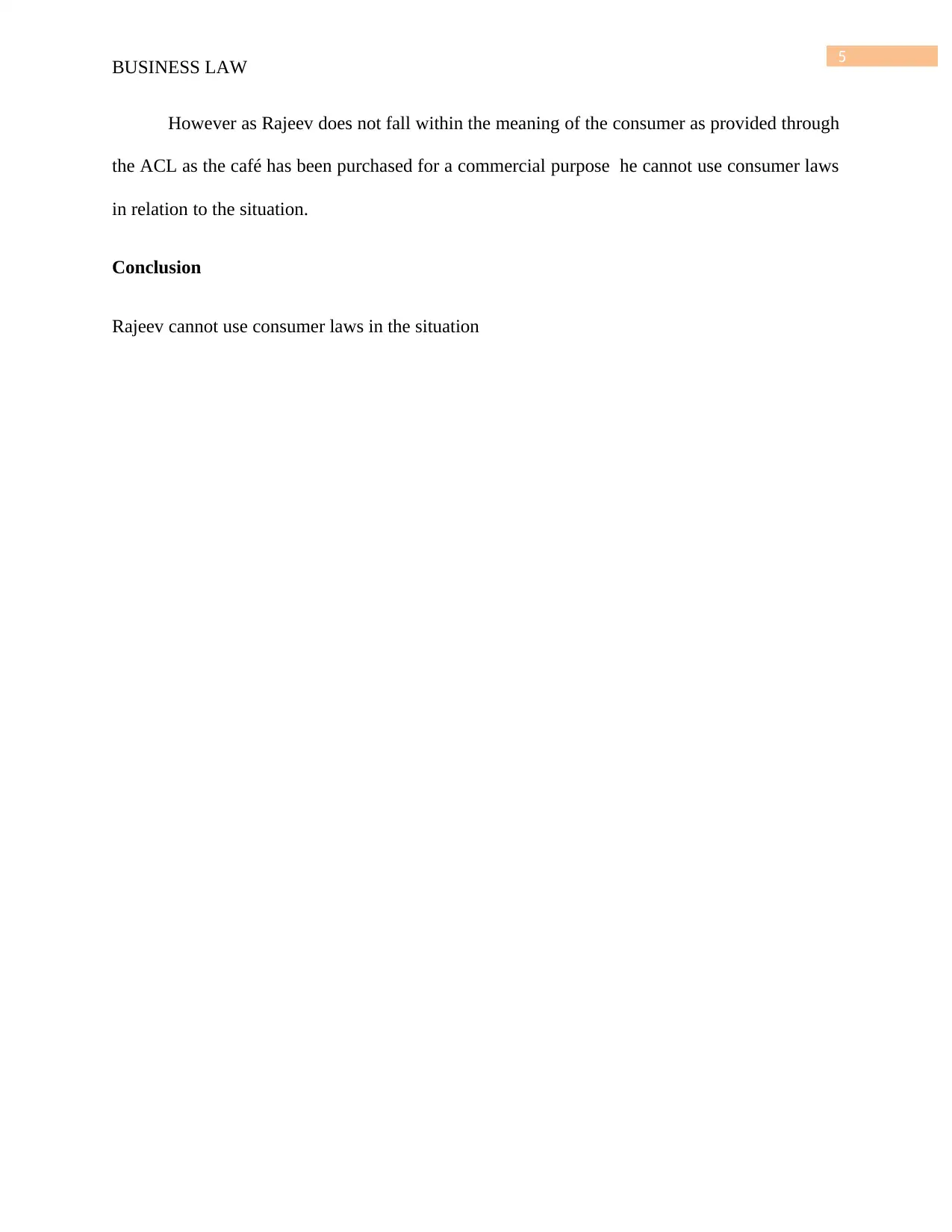
5
BUSINESS LAW
However as Rajeev does not fall within the meaning of the consumer as provided through
the ACL as the café has been purchased for a commercial purpose he cannot use consumer laws
in relation to the situation.
Conclusion
Rajeev cannot use consumer laws in the situation
BUSINESS LAW
However as Rajeev does not fall within the meaning of the consumer as provided through
the ACL as the café has been purchased for a commercial purpose he cannot use consumer laws
in relation to the situation.
Conclusion
Rajeev cannot use consumer laws in the situation
⊘ This is a preview!⊘
Do you want full access?
Subscribe today to unlock all pages.

Trusted by 1+ million students worldwide
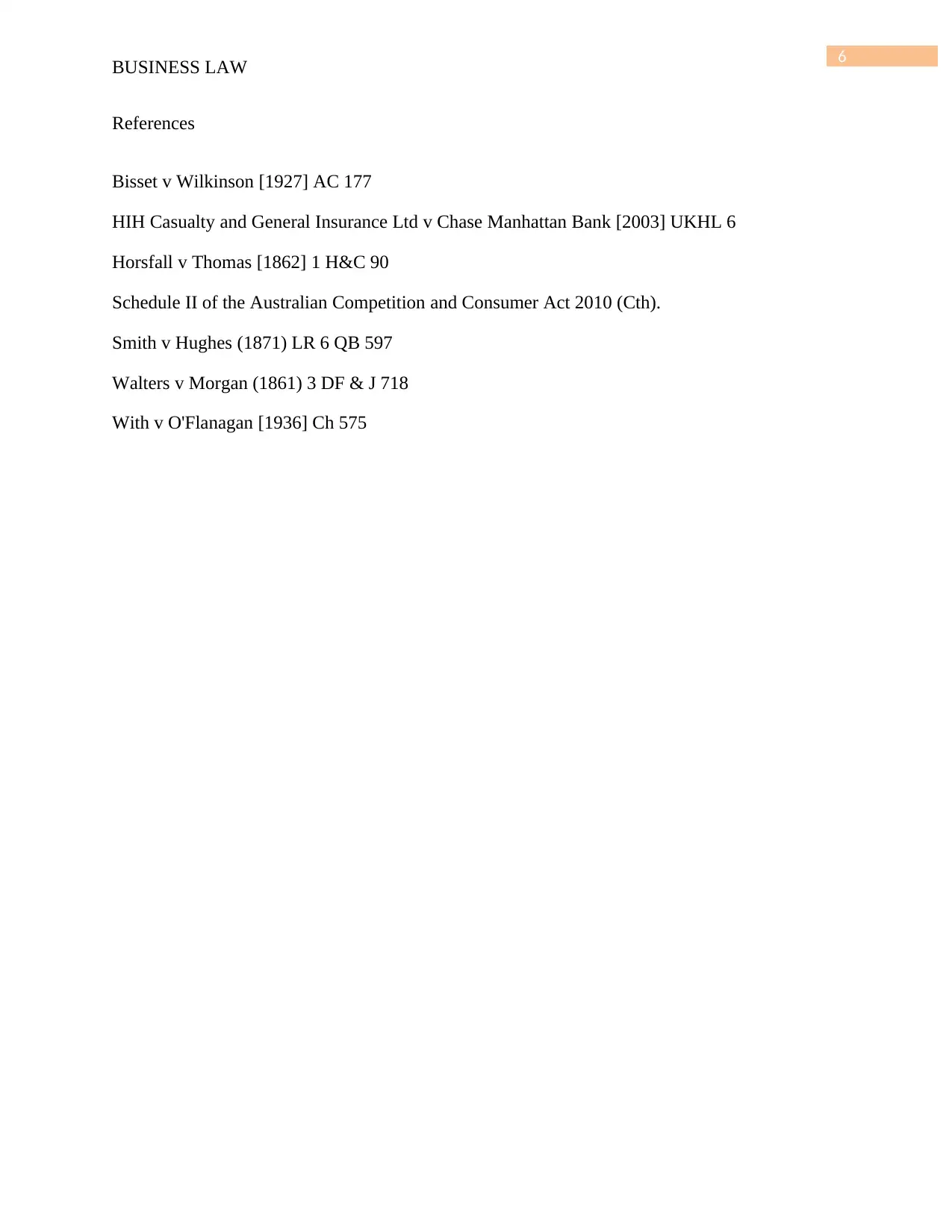
6
BUSINESS LAW
References
Bisset v Wilkinson [1927] AC 177
HIH Casualty and General Insurance Ltd v Chase Manhattan Bank [2003] UKHL 6
Horsfall v Thomas [1862] 1 H&C 90
Schedule II of the Australian Competition and Consumer Act 2010 (Cth).
Smith v Hughes (1871) LR 6 QB 597
Walters v Morgan (1861) 3 DF & J 718
With v O'Flanagan [1936] Ch 575
BUSINESS LAW
References
Bisset v Wilkinson [1927] AC 177
HIH Casualty and General Insurance Ltd v Chase Manhattan Bank [2003] UKHL 6
Horsfall v Thomas [1862] 1 H&C 90
Schedule II of the Australian Competition and Consumer Act 2010 (Cth).
Smith v Hughes (1871) LR 6 QB 597
Walters v Morgan (1861) 3 DF & J 718
With v O'Flanagan [1936] Ch 575
1 out of 7
Related Documents
Your All-in-One AI-Powered Toolkit for Academic Success.
+13062052269
info@desklib.com
Available 24*7 on WhatsApp / Email
![[object Object]](/_next/static/media/star-bottom.7253800d.svg)
Unlock your academic potential
Copyright © 2020–2025 A2Z Services. All Rights Reserved. Developed and managed by ZUCOL.





